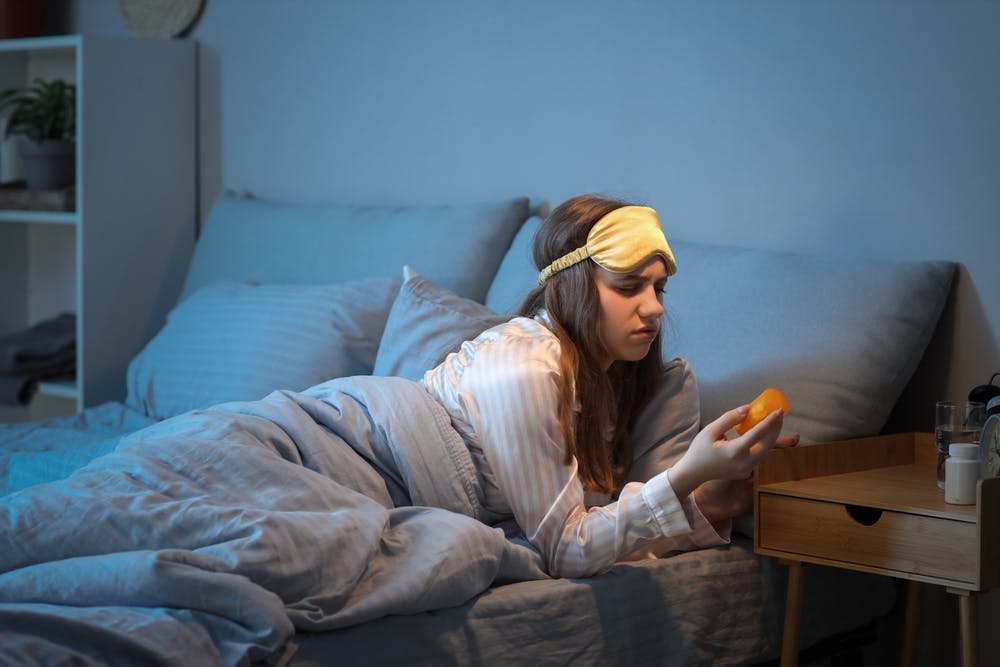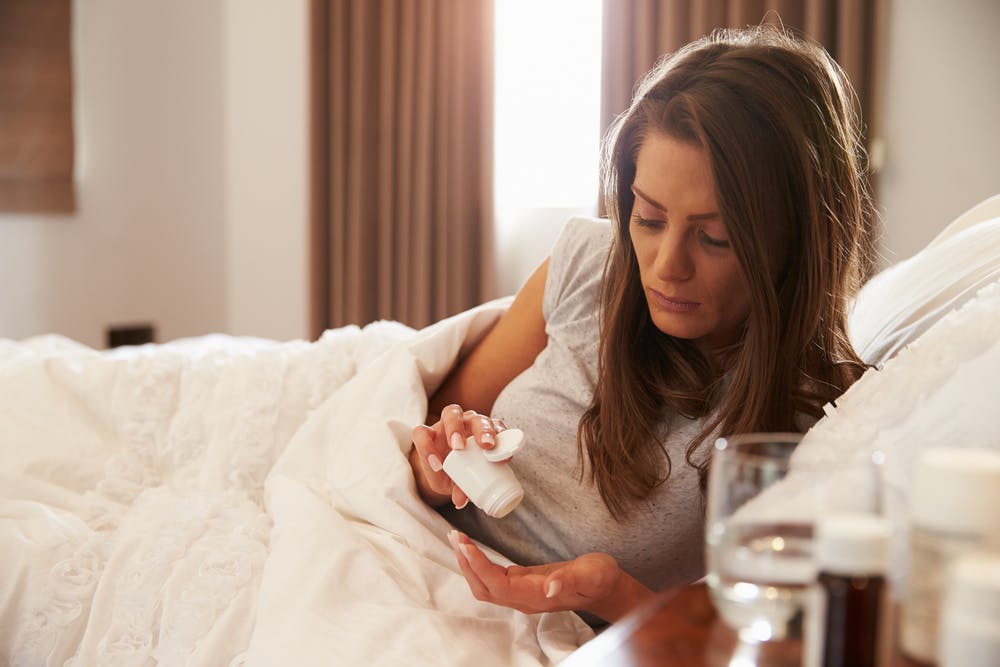Does Benadryl Make You Sleepy? What to Know Before Using It for Sleep
By Dr. Jossy Onwude, MD
Reviewed by Kenya Bass, PA-C
Published Jul 24, 2025
9 min read

If you’ve ever taken Benadryl and felt groggy or drowsy afterward, you're not alone. Many people notice that after using it for allergies or a cold, they suddenly feel ready for bed. Because of that effect, some people even take Benadryl on purpose to help themselves fall asleep at night. But is that a good idea? Is it safe to use Benadryl as a sleep aid? And what exactly causes the drowsiness in the first place?
This article explores those questions and more. We’ll explain what Benadryl is, how it works, why it makes you sleepy, and whether or not it’s actually a good choice for improving your sleep. We’ll also break down what science says about its effectiveness and offer healthier, longer-lasting alternatives for better sleep—without the side effects.
Let’s dive in.
What Is Benadryl and What Is It Usually Used For?
Benadryl is the brand name for a drug called diphenhydramine, which is an over-the-counter (OTC) medication. It’s part of a class of drugs known as first-generation antihistamines, and its primary job is to block histamine—a chemical your body releases when you’re having an allergic reaction.
Normally, Benadryl is used to relieve allergy symptoms like sneezing, runny nose, itchy eyes, hives, or even more intense conditions like an allergic rash. It’s also used to treat symptoms of the common cold and can help with nausea, motion sickness, and even mild cases of insomnia. Because it’s easy to get at most drugstores and works relatively fast, it’s one of the most common allergy medications people turn to.
But here’s where things get interesting: Benadryl doesn’t just block histamine in your nose or skin. It also affects your brain—and that’s where the sleepiness comes in.
How Benadryl Actually Makes You Feel Sleepy
To understand why Benadryl can make you feel tired, you have to know a bit about how it works in your body.
Histamine is a chemical your body uses for a lot of different things—not just allergies. One of its roles is in the brain, where it helps keep you alert and awake. When histamine levels are active in your brain, you’re more likely to feel awake and focused. So, when Benadryl blocks histamine, it’s not just calming your allergic reaction—it’s also lowering brain activity related to alertness.

Diphenhydramine, the active ingredient in Benadryl, crosses something called the blood-brain barrier, which is a filter between your brain and the rest of your body. Not all drugs can do this, but diphenhydramine can. Once it’s inside the brain, it blocks histamine receptors and starts causing sedation, or sleepiness.
For many people, this effect starts within 30 to 60 minutes after taking a dose and can last for several hours—sometimes up to 6 or even 8 hours. That’s why some people take it at night if they’re having trouble sleeping.
But does that mean it’s a good idea to use it as a sleep aid?
RELATED READ: LDN & Better Sleep: How Low-Dose Naltrexone Can Help You Sleep Better Naturally
Is Benadryl Safe to Use as a Sleep Aid?
This is where things get tricky. Yes, Benadryl does make many people feel drowsy. But that doesn’t automatically make it a good or safe solution for sleep problems.
Occasional use of Benadryl to help you sleep—say, once or twice a month—probably isn’t harmful for most healthy adults. If you’re traveling, fighting a cold, or going through a stressful period, it might help you get through a rough night or two. But using it regularly or relying on it as your go-to sleep fix can lead to some real problems.
First, there are short-term side effects. These can include things like:
- Dry mouth or throat
- Dizziness or lightheadedness
- Difficulty waking up in the morning
- Confusion or trouble concentrating the next day
- Feeling groggy or sluggish even after a full night of sleep
But the bigger concerns come with long-term or frequent use. Studies show that when people use diphenhydramine-based sleep aids regularly, the body builds up tolerance, meaning you’ll need higher doses over time to get the same sleepy effect. And the more you use it, the more your brain may become dependent on it to fall asleep—making it even harder to sleep without it.
This is known as rebound insomnia, where you actually sleep worse once you stop taking the medication.
There’s also a concern for older adults, who are much more sensitive to the side effects of drugs like Benadryl. In seniors, even small doses can increase the risk of confusion, memory problems, blurred vision, and falls. Because of this, the American Geriatrics Society recommends that older adults avoid diphenhydramine unless there’s no safer alternative.
If you're taking other medications—especially ones that affect the brain or nervous system—Benadryl can also interact with them in dangerous ways. Combining it with alcohol or other sedatives can seriously increase drowsiness and impair your ability to drive or think clearly.
So while Benadryl might seem like an easy fix for sleep, it’s not without its risks.
Why Benadryl Isn’t a Good Long-Term Solution for Sleep
If you’re having trouble sleeping on a regular basis, reaching for Benadryl might seem like a quick and easy solution. But here’s why it’s not the best path forward.
First, diphenhydramine doesn’t improve sleep quality. While it may help you fall asleep faster, research shows it doesn’t help you stay asleep through the night—and it can actually reduce the amount of deep, restorative sleep you get. That means even if you sleep for 7 or 8 hours, you might still wake up feeling tired.
Second, you can build up a tolerance to Benadryl pretty quickly—sometimes within just a few days. Once that happens, you may find that the same dose doesn’t work as well anymore. If you increase your dose, you also increase your risk of side effects.
Third, your body can get used to having Benadryl in your system, which can cause sleep disruptions when you stop taking it. This is the rebound insomnia mentioned earlier, and it’s surprisingly common in people who use over-the-counter sleep aids for more than a few nights in a row.
All of this adds up to one big takeaway: Benadryl is not designed to be a long-term solution for sleep issues. It was created to treat allergies—not insomnia.
When Using Benadryl for Sleep Might Be Okay (And When It’s Not)
That said, there are situations where taking Benadryl at night might make sense, especially if you're dealing with a short-term problem. For example, if you have a cold, sinus issues, or allergies that are keeping you awake, taking Benadryl for a night or two might help you get some rest while your body recovers.

But if you're reaching for Benadryl night after night without treating the root cause of your sleep problems, that’s a red flag. It’s especially important to be cautious if you:
- Are over 65 years old
- Take medications for anxiety, depression, or high blood pressure
- Have a history of memory problems or confusion
- Are pregnant or breastfeeding
- Have liver or kidney issues
In these situations, using Benadryl without medical supervision can be risky. Always talk to a doctor before using it regularly to help you sleep.
Better and Safer Alternatives to Benadryl for Sleep
The good news is that you don’t need to rely on Benadryl—or any drug—to get better sleep. There are safer, healthier, and more effective ways to improve your sleep naturally and long-term.
One of the best and most research-backed methods is something called Cognitive Behavioral Therapy for Insomnia (CBT-I). This is a short-term, structured therapy that helps people change the thoughts and habits that are interfering with sleep. In fact, many sleep experts consider CBT-I the gold standard treatment for chronic insomnia. And unlike Benadryl, it doesn’t come with any side effects.
If you're looking for a short-term solution while you work on better sleep habits, some people try melatonin, a hormone your body naturally makes to help regulate sleep. Melatonin supplements can be helpful, especially if your sleep schedule is off because of travel or shift work. But it’s important to use the right dose (usually 0.5 to 3 milligrams) and not treat it like a sleeping pill. Too much melatonin can actually make your sleep worse.
Other natural options that might support better sleep include:
- Improving your sleep hygiene—this means sticking to a regular sleep schedule, avoiding screens before bed, and keeping your bedroom cool, dark, and quiet.
- Trying magnesium, which some people find helps relax the body and improve sleep quality.
- Herbal remedies like valerian root, passionflower, or chamomile tea, though more research is still needed to confirm their effectiveness.
RELATED READ: Does Turkey Really Make You Sleepy? Best Foods to Help You Sleep Better (Backed by Science)
Frequently Asked Questions
1. Can I take Benadryl every night to sleep?
It’s not recommended. Regular use of Benadryl for sleep can lead to tolerance, side effects, and even dependence. It’s best used occasionally—and only if your doctor approves.
2. How long does Benadryl make you drowsy?
The effects usually last between 4 to 8 hours, depending on your body and dose. Some people still feel groggy the next morning.
3. Is Benadryl better than melatonin for sleep?
Not really. Benadryl may help you fall asleep faster, but melatonin works with your body’s natural rhythms. Melatonin also has fewer side effects when used properly.
4. Can I mix Benadryl with other sleep aids?
No. Combining it with other sedatives or alcohol can be dangerous and increase your risk of overdose or serious side effects. Always check with a doctor before mixing sleep medications.
5. What happens if I take too much Benadryl?
Too much diphenhydramine can lead to serious side effects, including hallucinations, rapid heartbeat, seizures, or even death. If you suspect an overdose, get medical help right away.
Final Thoughts: Should You Use Benadryl to Help You Sleep?
So, does Benadryl make you sleepy? Yes, it definitely can. The sedating effects of diphenhydramine are well known and often strong enough to knock you out within an hour. But that doesn’t mean it’s the best—or safest—way to improve your sleep.
Using Benadryl once in a while is probably fine for most healthy adults. But relying on it regularly can lead to tolerance, poor sleep quality, and unwanted side effects. If you’re struggling with sleep on a regular basis, the smarter move is to focus on long-term strategies that actually support your sleep health—like cognitive behavioral therapy, good sleep hygiene, or safe, natural supplements.
Your sleep is important. And while quick fixes are tempting, the best results usually come from sustainable changes that treat the root cause—not just the symptoms.
Share this article

Estrogen Patch Benefits for Menopause: Uses, Safety, and What to Know
Editorial Team
Jan 29, 20266 min read

Oral Tirzepatide Drops: What They Are, How They Work, and What to Know
Dr. Priyali Singh, MD
Jan 28, 20265 min read

How to Increase Estrogen Naturally: What Works, What Doesn’t, and When to Get Help
Dr. Priyali Singh, MD
Jan 27, 20266 min read

Best-in-class care is a click away
Find everything and everyone you need to reach your metabolic health goals, in one place. It all makes sense with Meto.
Join Meto